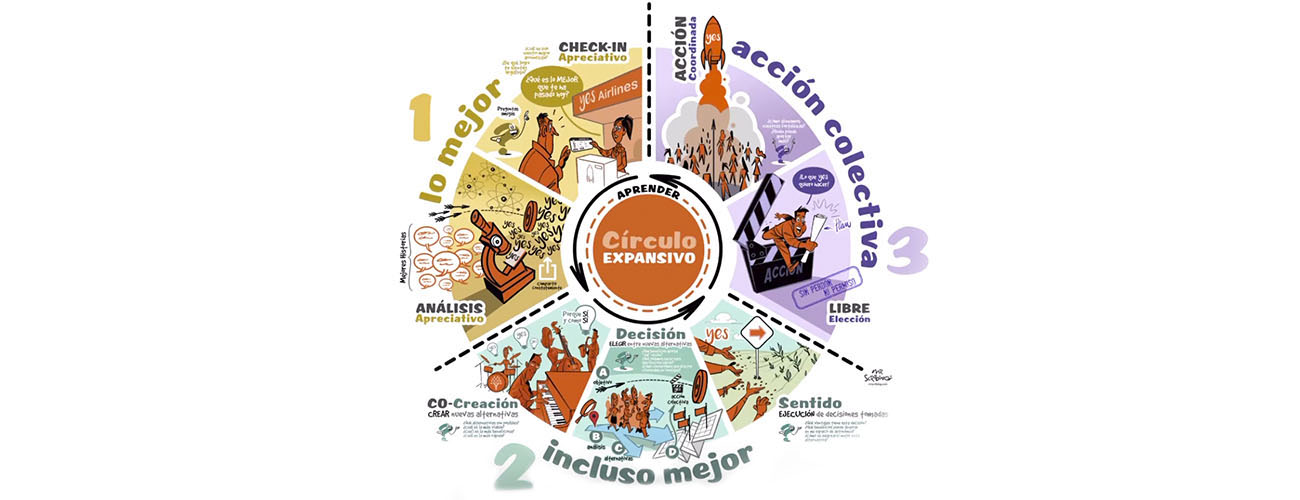In many articles on this blog we have talked about Madavi’s methodology, “Change the way we change”, which basically consists of transforming a company in 3 steps:
First phase: Takeoff
This is about aligning strengths towards aspirations among many, creating collective action.
It starts with the pioneers, a group that represents the entire system to be transformed.
Second: Thrust
Mobilize everyone in the same direction, to multiply the energy of change and make each person a protagonist. The movement is what generates movement.
Third phase: DNA
This phase is mostly carried out on a day-to-day basis, in smaller groups, during short periods and in self-managed spaces. Acting on what is repeated, so that the change will be irreversible and self-propelled.
By maintaining this dynamic over time, the system will continuously and naturally transform, making aspirations the “new normal”.
Result: Transformation arrives and it stays!
As a result, there is: a more energizing change – easy, rapid and simultaneous. And the transformation not only arrives but also stays.
In this blog, we have also talked on many occasions about one of the main tools that we use in Madavi to “Change the way we change”: Appreciative Inquiry, AI, which means putting the focus on strengths.
AI is based on appreciating the best of what there is: capacities, connections, resources and possibilities. Everything that we do have and that gives us success.
6 more methodologies to “Change the way we change”
Appreciative Inquiry is not the only effective methodology we use at Madavi; we also work with: Positive Deviation, Expansive Circle, Conversations Worth Having, SOAR, Focus on Solution, and Thinking Partner.
Positive Deviation
Positive deviation is a form of change based on observation.
Positive deviation is based on the observation that in every community there are certain individuals or groups whose unusual practices allow them to find better solutions to problems than their neighbours or colleagues, despite having access to the same resources.
The change begins when you investigate how these exceptional results are achieved with the same resources; it is shared and learned across the whole organization.
Conversations Worth Having
Conversations Worth Having are those which you come out of with more energy and better prepared to succeed; they allow you to increase your motivation, productivity, commitment, proactivity and creativity.
We are in a period in which there is less face-to-face interaction. However, it is important to note that having a meaningful conversation is one of the best ways to communicate with one another.
Conversations Worth Having are those in which we show genuine interest in others. In these conversations, the intention is to connect at a deep level, with everyone involved feeling accepted and understood without judgment. It’s not about impressing others with our opinions, but about sharing our experiences, hopes and dreams.
In a Conversation Worth Having there is room for moments of reflection, and the opportunity to genuinely delve into the feelings and thoughts of the other person.
SOAR
SOAR, the creation of Jackie Stavros, proposes a positive approach to strategic thinking, planning and leadership that is centred, as its acronym suggests, on Strengths, Opportunities, Aspirations and Results in the strategic dialogue.
Weaknesses and threats are not ignored, but are reframed and focused more appropriately within the opportunities.
Energy is centred on what you do best so that you achieve a competitive advantage, searching for a source of energy and confidence in order to set minor and major goals and achieve the desired results.
The “expansive circle”
The “expansive circle” is a methodology that generates action in teams; to lead team meetings in a way that lifts spirits and motivation, and moves people towards action.
In a first phase, the situation is analysed appreciatively, that is, asking what is the best thing that has happened. In the second, the team begins to co-create, thinking about how they can do it even better. In the third, actions and initiatives are decided, both collective and individual, as we say in Madavi “without pardon or permission”; initiatives that we can all do autonomously. This generates action and movement.
Focus on Solution
In a world where problems seem to multiply exponentially, how can we focus on the solutions and not just the obstacles? The answer is simple: adopting the “Focus on Solution” approach.
This methodology is based on the idea that, to solve a problem, it is essential to focus on the solution rather than the causes or consequences of the problem. By focusing on solutions, our mental and emotional energies are focused on seeking alternatives, rather than obsessing over a problem that generates anxiety and inaction.
Thinking partner
In an increasingly interconnected and complex world, it is essential to have a companion in thought, someone who is willing to accompany you in exploring ideas, challenges and opportunities. This companion is known as a “thinking partner”.
A “thinking partner” is someone with whom you can collaborate creatively and critically to address problems, develop ideas, and make decisions. Unlike a mentor or coach, the “thinking partner” is an equal in terms of experience and knowledge, something that creates an environment of collaboration and mutual respect.
The essence of the “thinking partner” lies in their ability to listen actively, ask challenging questions, and provide fresh and different perspectives. They act as an intellectual mirror, broadening our vision and helping us to explore our ideas and beliefs in depth.
One of the main advantages of having a “thinking partner” is that it provides us with a safe space to share ideas and reflections without fear of being judged.
And as you know, if you want to change the way your organization changes, at Madavi we have a different way of helping you that will facilitate your success. Call us or write to us!


